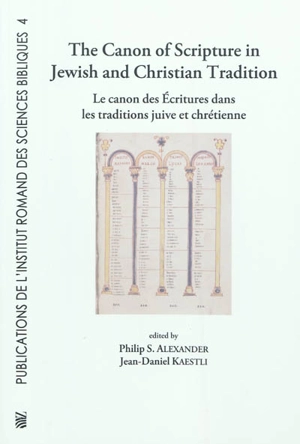
Le canon des Ecritures dans les traditions juive et chrétienne. The canon of Scripture in Jewish and Christian tradition
Versailles, Lyon 2ᵉ, Lyon 6ᵉ...
Ce que dit l'éditeurL'Institut romand des sciences bibliques (IRSB) de l'Université de Lausanne est un centre spécialisé porté par les trois facultés de théologie protestante de Suisse romande : Genève, Lausanne et Neuchâtel. L'IRSB a pour mission de promouvoir la recherche dans le domaine des sciences bibliques, de proposer en permanence un programme de formation postgrade en sciences bibliques et d'offrir à un public large des services qui favorisent la connaissance et l'étude du monde biblique. L'IRSB joue un rôle moteur dans le programme international d'édition de la littérature apocryphe chrétienne (AELAC) et constitue une base de données bibliographiques destinée à la recherche sur la Bible et le monde ambiant (BiBIL). The present volume is the product of an ongoing collaboration between the Institut Romand des Sciences Bibliques of the University of Lausanne, the Centre for Biblical Studies in the University of Manchester, and the Department of Biblical Studies in the University of Sheffield. Researchers from these three institutions meet on a regular basis to pool their expertise and to explore together a topical issue in the field of Biblical Studies. The theme of the colloquium whose papers are here published was the Canon of Scripture. For a variety of reasons the old certainties as to how canonisation occurred have been challenged in recent years by new evidence and by new critical perspectives. The very concepts of « canon » and « canonisation » have been problematised. It was felt the time was ripe for a fresh exploration of the issues. Philip R. Davies : How to Get Into the Canon and Stay There Or : The Philosophy of an Acquisitive Society Thomas Roemer : La mort de Moïse (Deut 34) et la naissance de la première partie du canon biblique Albert de Pury : The Ketubim, a Canon Within the Biblical Canon Philip S. Alexander : The Formation of the Biblical Canon in Rabbinic Judaism George J. Brooks : « Canon » in the Light of the Qumran Scrolls Jean-Daniel Kaestli : La formation et la structure du canon biblique : que peut apporter l'étude de la Septante ? Loveday C. A. Alexander : Canon and Exegesis in the Medical Schools ofAntiquity Daniel Marguerat : Des « canons » avant le canon ? Enrico Norelli : La notion de « mémoire » nous aide-t-elle à mieux comprendre la formation du canon du Nouveau Testament ? Gillian A. Beattie : The Fall of Eve : 1 Timothy 2,14 as a Canonical Example of Biblical Interpretation Ephrem Lash : The Canon of Scripture in the Orthodox Church Not all the issues around the biblical canon could be canvassed in one seminar and one volume, but it is hoped that a sufficient number of them are here addressed in a fresh way to open for the reader a window on current debates. |
RésuméContributions d'universitaires au congrès organisé par l'Institut romand des sciences bibliques de l'Université de Lausanne, le Centre for Biblical studies de l'Université de Manchester (GB) et le Department of Biblical studies de l'Université de Sheffield (GB), autour des concepts de canon et de canonisation des textes bibliques et de ce qui les a déterminés. ©Electre 2025 |
Caractéristiques Éditeur(s) Date de parution
15 janvier 2007
Collection(s)
Publications de l'Institut romand des sciences bibliques
Rayon
Christianisme
Contributeur(s) Philip S. Alexander
(Editeur scientifique (ou intellectuel)), Jean-Daniel Kaestli
(Editeur scientifique (ou intellectuel)) EAN
9782940351077
Nombre de pages
253
pages
Reliure
Broché
Dimensions
24.0
cm x
17.0
cm x
cm
|

